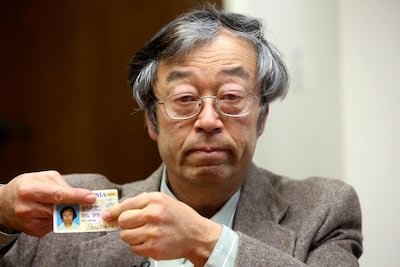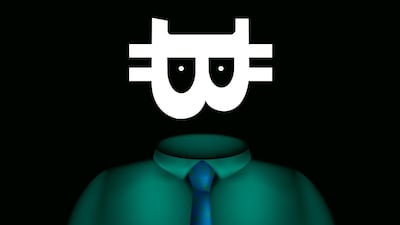The blog post, published last week on a nondescript website, was like millions of others. Its first sentence, however, ensured that speculation about its contents would light up the web: "I am Satoshi Nakamoto."
This is the pseudonym of the author of the 2008 white paper that first described digital currency Bitcoin. That white paper was a revolutionary piece of work that turned the financial world upside down and the associated invention of the database underpinning Bitcoin, blockchain, would become a part of the so-called Fourth Industrial Revolution. In December 2010, however, Nakamoto – whoever that might be – stopped posting on a Bitcoin forum and there has been speculation over his or her identity ever since. Nakamoto's posts have been forensically analysed for information, but with little success.
Faketoshi: the name given to those who claim to be Nakamoto
Many people have faced claims that they are Nakamoto, and many denials have been issued. Many more people have claimed to be Nakamoto, but they were rarely believed. Claims of the kind made last week are now referred to by another name: Faketoshi.
Titled My Reveal, the author of the blog post – who described himself as a former support analyst for the UK's National Health Service – stated some numerological and linguistic justifications for various aspects of Bitcoin, only for his inconsistencies to be quickly ripped apart by thousands of doubters.
But if not him, then who? And why, given the technologies behind Bitcoin and blockchain seem to be working pretty well, is there such interest in unmasking the real Nakamoto?
"It's important to understand that blockchain is considered to be anti-authority, anti-establishment," says Olinga Taeed, professor of blockchain at Birmingham City Business School. "But now regulators have the upper hand, operations are being shut down and legislation is being introduced. It's throttling back the revolution. As a result, the community desperately wants leadership. Part of the success of Bitcoin and blockchain is that it hasn't got a central body or a leader, but that's also its Achilles heel."
It's not surprising that the privacy-conscious cryptographer who invented Bitcoin would want to preserve the mystery of their identity. If unmasked, plaudits may well come their way, but governments could hold them liable for crimes committed using the currency. In addition, as its inventor, Nakamoto is estimated to own about one million Bitcoin (Dh38 billion) on which taxes could be sought. The invention of a successful digital currency, it seems, comes with huge responsibilities.
The list of suspected Satoshi Nakamotos is long
The list of people thought to be Nakamoto is long. In 2014, Newsweek named him as Japanese-American physicist Dorian Nakamoto, who turned out to have little in common with the Bitcoin founder other than a surname.
Finnish sociologist Vili Lehdonvirta, Irish cryptographer Michael Clear and Japanese mathematician Shinichi Mochizuki have also been suggested as candidates. In February, Tesla chief executive Elon Musk felt compelled to deny that it was him. "About 18 months ago there was even a blog post saying that I was Satoshi," says Taeed. "I've also heard people looking for investment claiming they work with Satoshi and that they're about to release a new product. The name brings attention."

For self-publicists, using Nakamoto's name is a surefire way of provoking curiosity. Earlier this year, British-American businessman John McAfee announced he would expose Nakamoto's true identity, only to back down shortly afterwards.
A company connected to the brother of drug lord Pablo Escobar, Roberto de Jesus Escobar Gaviria, has registered the Bitcoin trademark. This year, a colouring book and a book of illustrations are both due to be published under Nakamoto's name. In May, Chinese entrepreneur Wei Liu registered the copyright for the original Bitcoin white paper, "just to let people know anyone can register a copyright. Everyone can be Satoshi Nakamoto".
Even the person with the strongest claim, Australian computer scientist Craig Wright, who was outed as Nakamoto by Wired magazine in 2015 and later said it was true, is now considered to be simply another Faketoshi.
Who is Australian computer scientist Craig Wright?
Wright certainly knows a lot about Bitcoin and its creation. In a lengthy article published in the London Review Of Books in 2016, Andrew O'Hagan tells Wright's story in detail. An extraordinary mathematician and programmer, he claims to have forged the idea of Bitcoin with several people whose names regularly crop up around the Nakamoto legend, including cryptographer Hal Finney and computer forensics analyst Dave Kleiman (both now deceased).
The stash of one million Bitcoins mined by Wright and Kleiman in the early days was, according to Wright, placed in a trust when the Australian felt it too dangerous to hang on to them. Short of cash, he signed a business deal that established him at the centre of a new company dedicated to cryptographic inventions, but as part of the agreement Wright was contractually bound to reveal himself to be Bitcoin's founder. When it came to the crunch, however, his proof – the use of a cryptographic key that only Nakamoto could know – was shown to be bogus. Wright had either taken fright at the crucial moment, or he was lying.
The case that Wright is Nakamoto and couldn't bring himself to admit it is strong. He would have been aware of possible action against him as a consequence of being unmasked and those present at the "big reveal" have spoken of Wright's visible emotion. But he has now been discredited, with Wired noting that it "no longer believes Wright is likely to be the creator of Bitcoin". Wright, now on the speaking circuit, has made factual blunders in speeches that are seized upon by people wishing to undermine his case to be Nakamoto. But the refusal of the Bitcoin community to believe Wright, or any other claimant, almost reveals an unwillingness to credit any human being with such an ingenious invention.
As Wright has said: "I've had too many conversations with people who get annoyed because it's me."
Taeed agrees. "It's true that if Bitcoin had someone at the top, it would ruin the way all participants believe that they are players in it," he says.
Sometimes mysteries can be so compelling that the prospect of them being solved feels distinctly unwelcome. Any future Faketoshis would be wise to remember this.

